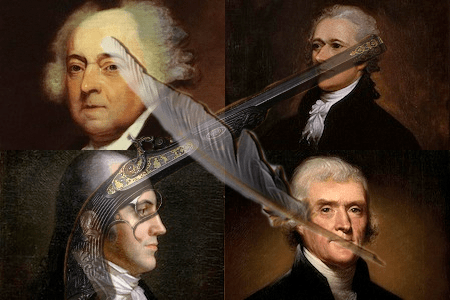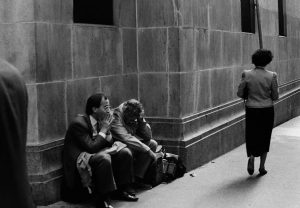After watching the current events of this 2016 election, the American people can agree as a whole that this Presidential race has been significantly different than ones we have seen before. The two candidates take and give personal blows to each other, and the electorate watches as what seems as the most personal election in recent history. With careful consideration of previous American Presidential Elections, one might be reminded of another election just as personal, maybe even more so, than our current one. The Election of 1800, or as Thomas Jefferson put it: the “Revolution of 1800.”1
This gruesome election was between Federalist and incumbent John Adams with his running mate Charles C. Pinckney and Democratic-Republican and principal author of the Declaration of Independence Thomas Jefferson with his running mate Aaron Burr. In this story we have an interesting cast of characters, all of which are very prominent figures in the history of the early Republic. The men involved had intricate personal relationships that acted as a catalyst in the crucible that would become the Election of 1800.
All men involved came from some form of political or military merit. John Adams was a prominent voice in declaring America’s Independence. Thomas Jefferson had been the United States Minister to France (he had spent a majority of the war and its aftermath in France). Aaron Burr had been a colonel in the Continental Army. Most of the men were quite fond of each other due to the fact that they had worked with each other before, although all had one thing in common: their distaste for Alexander Hamilton, Chief de Aide for General George Washington during the Revolutionary War and Senior Officer in the Continental Army. Hamilton was a stubborn man. Years before the election Hamilton had attempted to destroy Adams in his Adams’ Pamphlet, 2. He continuously bashed heads with Jefferson, while both he and Jefferson served in George Washington’s Presidential Cabinet in the early 1790s; and Hamilton was very vocal in his distaste of Aaron Burr.

At the beginning of the race, much of the American population was not too fond of President Adams’s Administration. With the implementation of the highly unpopular Alien and Sedition Acts, which was an act of law signed by Adams himself in 1798 that allowed the deportation of foreigners, the Federalist party itself seemed to fall apart. Only some truly supported Adams. With the relative unity of the Democratic-Republican Party and the particular favoritism of Jefferson in the South and Aaron Burr in New York, the Federalists feared that their opponents would win the presidency. In November of 1800 the election began, and as the ballots came in, the results only surprised a few. Adams received sixty-five votes while Jefferson received seventy-three. The election seemed to have been won, but something went wrong. The members of the electoral college failed to hold back one of their votes for Burr, which caused a vote count tie of seventy-three votes for each Jefferson and Burr, and thus propelled the two into a one on one race for presidency. 3
Alexander Hamilton, seeing both of his enemies with the potential to become president, felt himself in a sticky situation. Adams seeing this, laughed at Hamilton, saying,“The very man—the very two men—of all the world that he was most jealous of are now placed above him.”4 Hamilton had to put his pride aside and place his support behind one of these men for the betterment of the country.
Aaron Burr, being Jefferson’s running mate, was also put in an uncomfortable situation. He came into the race as just a Vice Presidential candidate; now he had to go against Jefferson for the presidential seat. Most people believed that Burr should just give Jefferson the position, even if Burr might have won by a landslide in the coming vote in the House, where the tie would be decided. This was not Burr’s intention. After being Jefferson’s running mate in the previous election, the Election of 1796, Burr had been left with a bitter taste in his mouth after Jefferson himself won the Vice Presidency and left him with nothing in fourth place. Burr even went so far as to say “As to my Jeff, what happened at the last election (Et tu Brute!).” 5 Burr was in it to win it.

Now that Adams, the Federalist Presidential Nominee, was out of the picture, the Federalists were in a scattered frenzy over whom they should pick: Jefferson or Burr. Most contemplated giving their votes to Burr due to the fact that most Federalists saw Jefferson as unfit to run for such an office, or as Robert G. Harper, a Federalist, put it: Jefferson was possibly able to be “a professor in a college or a president of a philosophy society,” but definitely not the head of our nation. 6 Others that were in favor of Jefferson were known to be quite violent in their advocacy, some even stating that if Burr were elected in place of Jefferson “we will march and dethrone him as an usurper.” 7
Finally, in February of 1801, the voting went to the House of Representatives. All sixteen states were allowed a single vote, and the winner only needed a majority of nine votes. The voting went on for five days. Tensions rose, state militas threatened to rise if a president was not elected. The House went through thirty-five votes, and each time they reached the same result: a tie. Then men grew restless and began to seek out an easy way out, and this is when Hamilton seized any opportunity he could to write to each of his Federalists colleagues in the electoral college to either withdraw their vote or place it for Jefferson.
James A. Bayard, a Federalist from Delaware, began to listen to Hamilton’s plea. For all thirty-five previous votes, Bayard had voted for Burr, but after reading Hamilton’s letters, Bayard began to weaken his support for Burr. Finally on the thirty-sixth vote, Bayard inserted a blank vote and abstained Delaware’s vote. At the same time two other representatives gave in as well and also withdrew their votes, allowing Jefferson to win ten votes, and thus win the presidency.
The general confusion of the Election of 1800 led the next Congress to pass the Twelfth Amendment, which revised the way the electoral college elected the President and Vice President. In addition to the passing of the Twelfth Amendment, personal feuds came to fruition after Burr’s lost. Burr believed Hamilton was the greatest impediment in his path for success and challenged him to a duel. In 1804, both left to New Jersey and Burr shot down Hamilton.
- Alan Brinkley, American History: Connecting with the Past. Volume 1: to 1865 (New York: McGraw-Hill Education, 2015), 177. ↵
- Ron Chernow, Alexander Hamilton (New York : Penguin Press, 2004), 619. ↵
- Brinkley, American History: Connecting with the Past, 178. ↵
- Chernow, Alexander Hamilton, 632. ↵
- Chernow, Alexander Hamilton, 634. ↵
- Chernow, Alexander Hamilton, 634. ↵
- Chernow, Alexander Hamilton, 635. ↵



84 comments
Courtney Mcclellan
This article was very informative and interesting. It was interesting to find out that Burr and Jefferson were initially running together. It was nice to here about the mistakes of the ballads and the repercussions of that mistake. Its fun to think what would have happened if that ballot had gone through, there would have been no need for the Hamilton Burr duel.
Madeline Chandler
Such an informative and interesting article! Very captivating. Honestly, I am familiar with the story of Alexander Hamilton, yet I am not familiar with election process and tension behind everything. I think that it is interesting how George Washington favored both Thomas Jefferson and Alexander Hamilton yet they did not like one another. I loved reading your article. Great job!
Jaedean Leija
I think the author is very talented with what he did when comparing both elections. when reading the article it flowed nicely if I knew anyone who wants to learn more with what Hamilton did then I would definitely refer them to this article. With an article I read before reading this one both articles are similar both are good but they explain different views or reading both gives you a better understanding of what has happened.
Angelo Oliva-Noeggerath
Great Article! The pictures help visualize the two individuals and especially the image of Burr, and Jefferson which helps apply to the feeling of a rivalry between the two as there had been such a situation. The sources used are kept easily navigable throughout the article and help with knowledge of what is credible and used.
Aaron Onofre
Reading this article makes think of how Aaron Burr had to constantly struggle to gain a position and I can understand why when he was given the opportunity of becoming the president, he went for it without hesitation. I would also have to applaud Alexander Hamilton’s decision to speak up on who to vote for in the electoral voting. He was not forced but he understand that is was necessary for him to speak up so that a decision could be made to put the country at ease.
Seth Roen
I find that this was a great article on the Revolution of 1800 and how it shows that this nation continues to change party hands almost every election. You also indicate that the elections we see today are not much different compared to the nation’s first election. It shows that not much changed, just only the parties and their goals.
Kensley Dieckow
Wow this article was very eye opening and put into perspective what elections were like in the beginning years of America. I also liked how you included information about Hamilton because he really did have such a large impact on the election and makes you understand why Burr had so much hatred for him. Great article, this election was very interesting.
Santos Mencio
It’s interesting how the events of this election directly played into the death of Alexander Hamilton. It is also curious to note how much influence men like Hamilton had over things like elections. As him simply putting pressure on the House of Representatives to come to a consensus was enough to push the election in Jefferson’s favor. I can certainly understand the frustration experienced by the American states, it seems like many of them simply wanted a president chosen.
Marycarmen Sanchez
I enjoyed how this article brought up modern history and ties it in so well. I have a feeling that you spent a lot of time fact checking everything to write a very accurate article. It was easy to read while the images also provided a good understanding of what was happening. Thank you for keeping everything in a good order and not jumping around from event to event.
Amelie Rivas-Berlanga
This article was super interesting and kept my attention. This was a great topic to write about. Bringing light to something we think as normal. How frustrating must it have been for them to try and figure out a solution to a problem they have never encountered. The images included really tie the piece together. The ending is something I only recently learned happened. It is so cool to see how serious these things were to them.